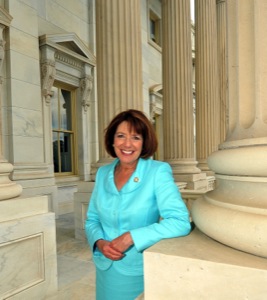
As the 2014 elections approach, you’ll hear about Rep. Scott Peters’ (CA-52) strong record on LGBT equality, for two reasons. First, it’s true. Second, the race is made-for-TV drama, with openly gay former San Diego City Councilmember and mayoral candidate Carl DeMaio challenging Peters, a one-term straight incumbent with the Human Rights Campaign (HRC) endorsement, in a swing district.
You’ll hear less about Rep. Susan Davis (CA-53), which is in some ways sad. Davis began her congressional career in 2000 by beating incumbent Rep. Brian Bilbray, 12 years before Peters accomplished the same feat. Since then Davis has built a reputation as an LGBT ally to which Peters and others can aspire. Her 70th birthday, celebrated Wednesday night at the San Diego Central Library, seemed a good time to say “thank you” to an ally whose support is too often taken for granted.
Davis’ contributions to equality get less attention in part because her campaigns rarely make news. Since ousting Bilbray in 2000 with just under 50 percent of the vote, she has won six consecutive elections with over 60 percent despite the district being revised twice and renumbered once.
Fortunately for San Diego’s LGBT community, her support of equality has been as assured as her elections. Davis has earned a perfect 100 percent on the Human Rights Campaign Congressional Scorecard for at least the past 10 years, and was a relatively early proponent of marriage equality. While such support is increasingly common, it wasn’t such a given in 2000, making her string of re-elections all the more impressive.
Further, if you ranked every congressperson with a 100 percent from HRC by leadership, Davis would be at or near the top. One can achieve 100 percent by trying to fly under the radar until the final vote. That’s not Davis. Not only has she been an early co-sponsor of most pro-equality bills, she has looked to push the envelope in new areas. She was a founding member of the House LGBT Caucus. On more than one HRC lobby day, Davis and her staff told us about new things they were working on, including jury equality and the possibility of one broad bill to clean federal laws from discrimination based on gender identity or sexual orientation.
Perhaps Davis’ greatest contribution to date has been the repeal of Don’t Ask Don’t Tell. Despite having a pro-equality majority after the 2008 elections, the House Armed Services committee was chaired by Rep. Ike Skelton, a somewhat conservative Democrat who did not favor repeal. As chair of the Subcommittee on Military Personnel, Davis held the first hearings on the policy since its enactment, and was a strong repeal advocate throughout. The Civil Rights page of her Web site continues to highlight a photo of her with HRC’s “Voices of Honor Tour.”
Davis has also worked to develop and elect leaders who share her vision, including Council President Todd Gloria, who frequently cites her as one of his earliest mentors. When she appears at a fundraiser in the LGBT community, it’s usually for an ally in a tougher race, like Peters. If they have Davis’ support, you should probably consider giving yours. Either way, it’s worth taking a moment to thank Rep. Davis for more than a decade of congressional leadership on LGBT issues.











